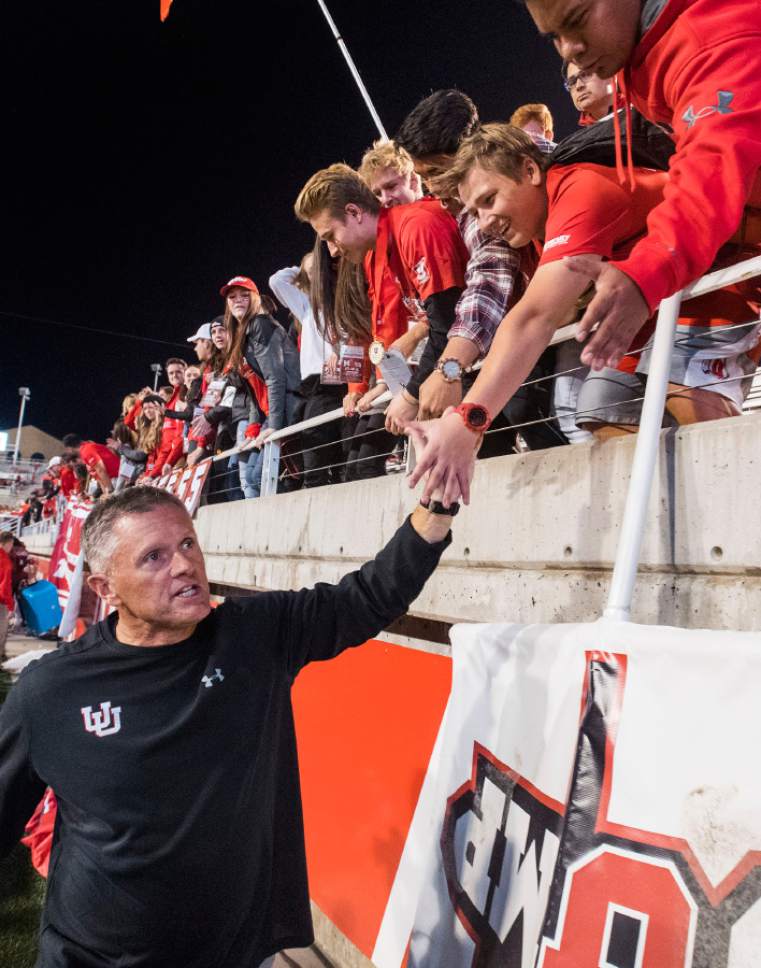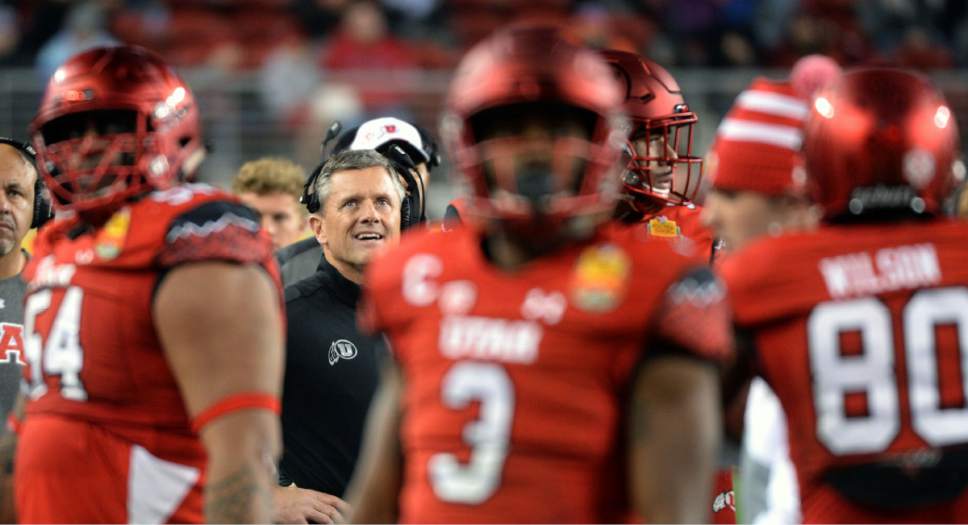This is an archived article that was published on sltrib.com in 2016, and information in the article may be outdated. It is provided only for personal research purposes and may not be reprinted.
So here he goes again. Kyle Whittingham is giving himself the (almost) annual opportunity to do something extraordinary with Utah's football program, for once.
He's persistent, if not consistent.
Will he succeed this time? Is this the moment when Whittingham's adventurous management of his offensive staff finally produces a Pac-12 South championship? Or is he doomed to remaining just short of the elite level of his profession, having never discovered an offense to match his defense?
Friday's moves of co-offensive coordinator Aaron Roderick's firing and running backs coach Dennis Erickson's retirement give Whittingham two offensive openings. Utah needs a quarterbacking expert. That's priority No. 1, whether the new coordinator has such expertise himself or brings in someone else to work exclusively with the QBs. A coach with a background like that of David Yost, newly hired as Utah State's offensive coordinator, is what Utah needs.
And the Utes require a fresh approach and full authority from Whittingham to operate a modern scheme. If that means an uptempo strategy, forcing Utah's defense to be on the field for more plays in a game, that's fine.
Whittingham needs to get this thing right — which is not to say he always has made the wrong choices. Yet partly because Norm Chow left after one season in 2011, Whittingham clearly never has found a lasting solution to Utah's offensive issues. Andy Ludwig departed following the 2009 Sugar Bowl and became a classic case of a coordinator who was more appreciated after he was gone, and the Utes have kept searching ever since.
The irony of Friday's news is it came while I was attending the Rose Bowl Media Day, talking to USC defensive players who allowed Utah's offense to score touchdowns on its last three drives in September as the Utes rallied for a 31-27 victory.
That game is evidence against Roderick, actually. The offense couldn't maintain any consistency and quarterback Troy Williams regressed during the season. Subtracting a one-play drive after a fumble recovery vs. Indiana in the Foster Farms Bowl, the offense produced a total of five touchdowns in the last three games. Who knows if the Utes could have driven into position for the winning field goal Wednesday without Joe Williams' runs of 21 and 32 yards — and his college career is over.
So should anyone be surprised by Whittingham's decision regarding Roderick?
No, because that's his management history, and he left enough openings whenever he was asked about staff evaluations since the regular-season finale at Colorado to make it apparent that he had some moves in mind. Last December, he dismissed receivers coach Taylor Stubblefield shortly after the Las Vegas Bowl.
But yes, because the latest move naturally will evoke some derision, with Whittingham employing an eighth play-caller (counting each Roderick's two stints) in nine seasons, since Ludwig left. In that sense, what looks like another impulsive move required some calculation and courage. Anyone who interviews with Utah will have to recognize Whittingham's demands of the position and be conditioned to such expectations. With a salary in the $500,000 range and the opportunity to direct a Pac-12 offense in a program with consistent defensive and special-teams play, though, the job undoubtedly is attractive.
Whittingham should be able to look beyond his usual, tight circle and find an innovator who can elevate Utah's offense. Will he do it, though?
Here's my ranking of Utah's play-callers, since Ludwig: 1, Chow. 2, Roderick (Mountain West era). 3, Erickson. 4, Roderick (Pac-12 era). 5, Dave Christensen. 6, Brian Johnson. 7, Dave Schramm.
My reasonably high ranking of Roderick may just reflect how low the standards for Utah's offense have become. You do have to feel some empathy for him. Not many coaches get fired after 12 years on a staff. He had a crazy tenure at Utah, with multiple promotions and demotions — which was partly his own doing, after he temporarily took jobs at Washington and BYU before changing his mind.
As for Erickson, he brought experience and Florida recruiting expertise to Utah. He probably was the most qualified person ever to join Utah's athletic department in any job. But he also had nothing to prove at this stage of his career.
In replacing Erickson, the Utes may benefit from a dynamic addition. Two of them would be helpful, actually.
Twitter: @tribkurt





